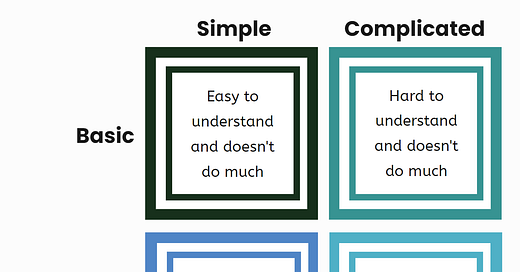Preparedness
Simplicity Versus Complexity
I have an attraction to simple ideas. But I also believe that life is increasingly complex.
I constantly quote the fundamentals of life, a concept I’ve shared many times in the last year.
I also refer to the million shades of grey that color our life as being way more significant than the one shade of white and one shade of black.
But these two ideas are at odds. Aren’t they?
Actually, no they are not at odds.
Creating a war between simplicity and complexity creates a false dichotomy or the belief that you must choose one or the other.
You don’t have to choose. Instead, ask the following questions so that you can break down the “thing” or “concept” into 1 of 4 quadrants:
An example of these quadrants in action could be if we go back to the Fundamentals of Life concept I shared before, they are Simple and Advanced concepts that wrap up my understanding of life into the things that matter the most to all of the humans I’ve observed.
How easy is it to understand?
Simple: Easy to understand
Complicated: Hard to understand
What can it do?
Advanced: Does a lot
Basic: Doesn’t do much
Using this breakdown allows you to treat both the ideas of simplicity and complexity as separate. If you want to get even fancier you can start to throw in other variables like time and efficiency to further break down the concepts in question.
The Worst Type of Unknown
At a February 12, 2002, news briefing, Secretary of Defense Donald Rumsfeld explained the limitations of intelligence reports:
"There are known knowns. There are things we know we know. We also know there are known unknowns. That is to say, we know there are some things we do not know. But there are also unknown unknowns, the ones we don't know we don't know."
It’s the unknown unknowns that keep us up at night.
The boogymen, the Apocolypse, the impending doom that’s sure to come.
We’ve experienced lots of unknown unknowns in recent years, especially in 2020. A global pandemic. An insurrectionist president. A flash crash (and rebound) in the financial markets. I could go on.
And in response, we see humans building walls and moats.
I Hate Doomsday Preppers
Here’s the fact: Doomsday Preppers assume that the world will go to shit in their lifetime.
In response to this fact, they hunker down.
Instead of working to stop Doomsday from happening, they decide to just worry about their own survival.
This is not selfish behavior, this is defeatist behavior. If they were selfish they would engage with their community and their country to see about changing our “fate”.
We’re Always At The Start
If you’re like me, you might often have this idea that at some point in our lives we discover the edge of the cliff. That is to say that at some point we’ve experienced all of our personal growth and change, and we won’t change anymore going forward.
And that’s just wrong.
This false idea is so popular that it has a name: The End of History Illusion
The end-of-history illusion is a psychological illusion in which individuals of all ages believe that they have experienced significant personal growth and changes in tastes up to the present moment, but will not substantially grow or mature in the future. Despite recognizing that their perceptions have evolved, individuals predict that their perceptions will remain roughly the same in the future. (Wikipedia)
We don’t just think this way about ourselves. We also project this onto our relationships, our jobs, our community, our economy, and countless other things that make up this human-centered planet.
We’re ALWAYS at the beginning of everything.
Inventions, innovations, collaborations, etc… all consistently feed off of each other and keep launching us forward.
For more on the topic, check out this scientific article.
Strategy 101
Analyze your current state.
Establish your desired future state.
Determine how you’re going to get there.
6 Word Stories
The CEO of the company I work for gave me some advice the other day:
“You are a man of many thoughts,” he said. “And a communicator. Lincoln once said (repeated by Mark Twain) I was going to send you a short letter, but in the absence of time, you will have to put up with this long one.”
I am a verbose type of individual and John is right, that through the exercise of time and effort I could do even more to simplify my message to you all.
Inspired by Hemingway’s famous six-word tale, “For sale: baby shoes, never worn,” the “six-word story” has served as a prompt for decades, testing writers’ ability to create their own succinct masterpieces.
I’m not yet capable of a 6-word story, but I’ll keep trying.
Results Pyramid
My college mentor gave me countless tools and golden nuggets of knowledge that I use to make sense of the world to this very day.
One of the greatest of these tools was the introduction to the results pyramid. It’s basically a simplified way to break down why we get the outcomes that we get.
Here’s a breakdown of the Results Pyramid to showcase how our experiences shape our beliefs which guide our actions and impacts our results:




